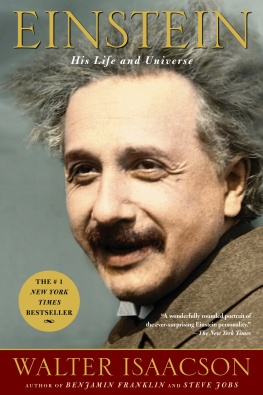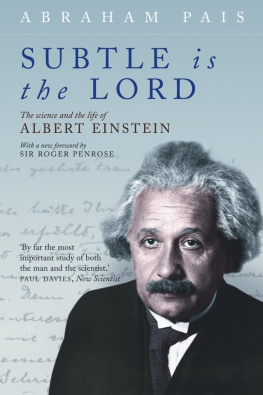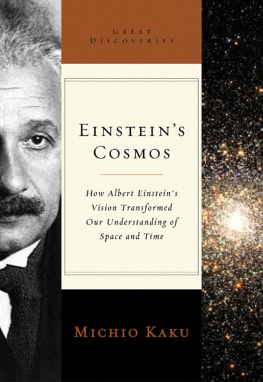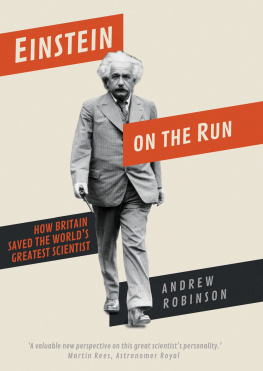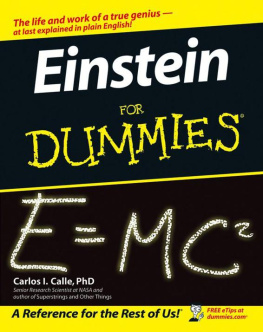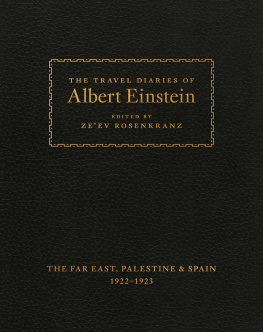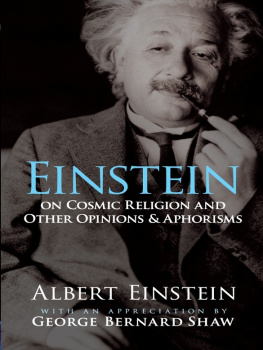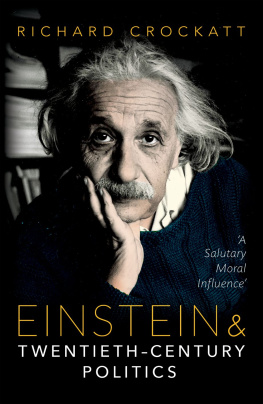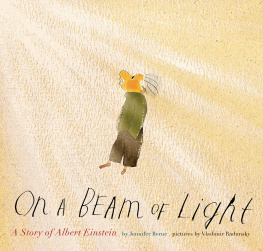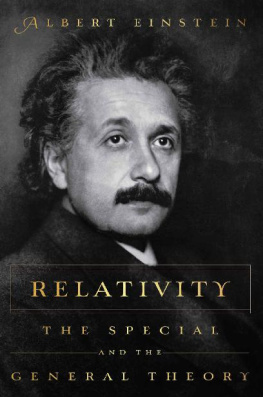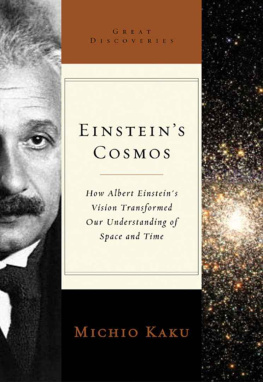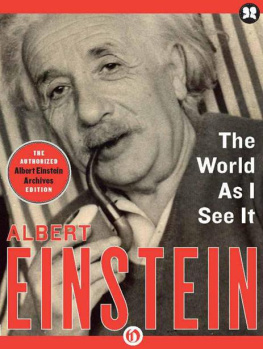
EINSTEIN

ON POLITICS
EINSTEIN

ON POLITICS
HIS PRIVATE THOUGHTS
AND PUBLIC STANDS ON
NATIONALISM, ZIONISM, WAR,
PEACE, AND THE BOMB

EDITED BY
DAVID E. ROWE AND
ROBERT SCHULMANN
PRINCETON UNIVERSITY PRESS
PRINCETON AND OXFORD
Copyright 2007 by Princeton University Press
Published by Princeton University Press, 41 William Street, Princeton, New Jersey 08540
In the United Kingdom: Princeton University Press, 3 Market Place, Woodstock, Oxfordshire OX20 1SY
Library of Congress Cataloging-in-Publication Data
Einstein on politics : his private thoughts and public stands on nationalism, Zionism, war, peace, and the bomb / edited by David E. Rowe and Robert Schulmann.
p. cm.
Inclubes bibliographical references and index.
ISBN-13: 978-0-691-12094-2 (cloth : alk. paper)
ISBN-10: 0-691-12094-3 (cloth : alk. paper)
1. Einstein, Albert, 18791955Political and social views. 2. Einstein, Albert, 18791955Ethics. 3. Einstein, Albert, 18791955Religion. I. Rowe, David E., 1950 II. Schulmann, Robert J.
QC16.E5E5157 2007
530.092dc22 2006100303
British Library Cataloging-in-Pulication Data is available
This book has been composed in Sabon with Eurostile family display
Printed on acid-free paper.
press.princeton.edu
Printed in the United States of America
10 9 8 7 6 5 4 3 2 1
CONTENTS

|
Chapter 8. |
LIST OF TEXTS
PREFACE
A s the most celebrated scientific figure of the twentieth century, Albert Einstein needs no introduction. His achievements and their impact on modern physics have been the subject of countless studies, just as his unique careerin which he rose from the obscurity of a Swiss patent office to prominence on the front pages of leading newspapers around the worldhas been described in books and articles pitched to almost every conceivable audience. Alongside this dominant image of Einstein as a lonely, singular scientific genius stands another: the familiar visage of the elderly humanist and pacifist. These two facets of Einsteins fameas scientist and humanitarianclosely correspond to two fairly distinct periods in his career: his most creative period, from 1900 to 1919, and the longer thirty-five-year span of his public fame.
For the latter years, countless reports bear witness to his selfless character and the sacrifices he made not only to promote human welfare in general but to aid powerless individuals who sought his assistance. Viewed by many as a man whose altruism and sense of humanity give him the stature of a Gandhi or an Albert Schweitzer, he continues to fascinate in part because of his ambivalence in the pursuit of justice. As he turned outward, voicing public warnings against the rise of militarism, fascism, and nuclear catastrophe, he also stepped back inside himself to take a stoical, almost ascetic view of life filled with personal reflections on religious and ethical issues.
While the public and private lives of Einstein, the scientist and world citizen, have long been followed with avid interest, it is only within the last two decades or so that his legacy as a political figure has begun to receive closer attention through biographical studies such as those by Jamie Sayen (1985), Albrecht Flsing (1993), Thomas Levenson (2003), and Hubert Goenner (2005). These books, together with the ongoing publication of the Collected Papers of Albert Einstein, have signaled a need to document the unfolding of Einsteins political thought in the context of the rapidly changing times in which he lived. Indeed, recent scholarship has finally begun to lift the veil of mystery surrounding Einsteins public and private lives, thereby revealing a far more complex and provocative personality than had ever been considered before.
There can be little point in trying to cordon off an authentic, private Einstein from the public figure who emerged on the world stage after 1919. One of our chief aims in this collection of texts is to convey the unity of what Einstein himself described as an apparent contradiction: My passionate interest in social justice and social responsibility has always stood in curious contrast to a marked lack of desire for direct association with men and women (What I Believe, ). Though he never relented in his lifelong flight from the merely personal, we hope to show that private thoughts and public passions sprang from the same source.
Our still-popular image of Einstein as a wise-cracking, wild-haired, saintly old man was, at least to some degree, a concomitant of his extraordinary fame. An integral part of his persona found expression in a lifestyle that demonstratively shunned worldly fame, but not the influence and responsibility that went with it. At the same time, his public image was burnished by his tendency to dispense wisdom in the form of quaint aphorisms, their charm heightened by suspension in what came to be regarded as a homespun Einsteinian universe independent of space and time.
That Einsteins politics were rooted in an abiding sense of moral responsibility also provides a partial explanation for the powerful hold on the public his political pronouncements continue to exert to this day. As part of that mystique, his writings and utterances have usually been recorded with little or no attention to their historical setting. Thus, while a number of the texts chosen for the present volume have appeared in earlier anthologies of his writings, many have never before been properly identified or contextualized. In some cases, in fact, it is unlikely that the original context can ever be recovered due to the casual methods employed by earlier editors. Moreover, the texts in the most popular Einstein collections have invariably been shorn of the specific historical circumstances that prompted their creation. With the exception of Einstein on Peace (N & N 1960), the authoritative, 700-page volume compiled by Otto Nathan and Heinz Norden, and to a lesser degree Siegfried Grundmanns work (1998) on the Berlin period, all previous collections of Einsteins nonscientific writings have paid scant attention to the issues he confronted and the ways he went about tackling them. Thus our aim in the present source book is to present Einsteins public and private musings on the political problems of his times in a new light that will prove useful for a general readership as well as for historians. Most of his articles and speeches are presented in extenso, while a significant number of letters are excerpted.
In an effort to restore the context and texture of Einsteins political thought as well as to document the range of issues he addressed, we have adopted a largely thematic structure in this book. Its ten chapters take up the major nodes of his political engagement, some of which he pursued for relatively brief periods, others throughout the course of his life. Within the subsections of each chapter, the texts are presented chronologically. Furthermore, the chapters themselves have been arranged with an eye toward retaining the chronology of Einsteins political activities. The commentaries are intended to show as precisely as possible which factors influenced his writings and actions at a given historical moment.
Next page

